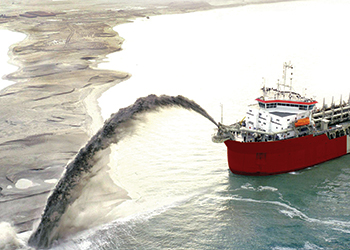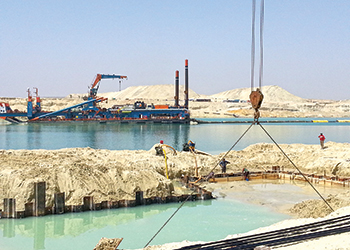
 Alyaf geotextiles ... important role on the Suez Canal project.
Alyaf geotextiles ... important role on the Suez Canal project.
Geosynthetics major Alyaf Industrial Company says its high-performance geotextiles were selected for application on the prestigious new Suez Canal project in Egypt against stiff international competition for a share of work on this crucial global route.
The Suez Canal is the shortest shipping route between Europe and Asia, which acts as an alternative to the Cape of Good Hope route. The enlarged canal will allow ships to sail in both directions at the same time over much of the canal’s length. This is expected to decrease waiting hours from 11 to three hours for most ships and to double the capacity of the Suez Canal from 49 to 97 ships a day.
The New Suez Canal is expected to be 72 km long. This involves 35 km of dry digging, and 37 km of ‘expansion and deep digging’ whereas the current canal is 164 km long. The shoreline has been designed to be protected using rock revetment with an engineered robust geotextile to prevent erosion of soil fines, explains a spokesman for the Saudi-based firm.
“As such, geotextile design and selection for canal/stream bank protection is highly critical because of the additional hydraulic conditions caused by the flow of water parallel to the length of the canal,” he points out.
Another challenge, according to the spokesman was the fact that the project was fast-tracked. He explains: “The construction of the new canal itself was initially scheduled to take five years. It was then first reduced to three years and finally ordered by Egyptian President Abdel Fattah Sisi to be completed within one year.
“This meant that the entire requirement of over 1.6 million sq m of geotextiles had to be made available at the site within a period of less than eight months.”
Alyaf’s team with superb coordination from its distributor in Egypt Mawad Trading rose to the challenge and is proposing technical solutions based on its versatile portfolio of drainage composites and polyester and polypropylene (PP) geotextiles.
“The logistics of supply from the manufacturing base at Dammam to the project site were planned and executed to perfection,” says the spokesman.
In addition to meeting the techno-economic criteria, he attributes Alyaf’s selection as the supplier to this key project to a number of factors. These include its:
• Professional experience of more than 20 years in the region in the use of geotextiles;
• Successful track record of supplying to large marine projects like the Khalifa Port (UAE), Salalah Port (Oman), Ras Al Khair Port (Saudi Arabia), Gorgon Port (Australia) and many others.
• State-of-the-art manufacturing facility with multiple production lines; and
• Support of a team of dedicated engineers “for whom meeting and overcoming challenges is a passion”.
Established in 1992 as a specialised manufacturer of high-quality geotextiles, Alyaf has pioneered the development of geotextiles in the region and has worked closely with major consultants and government departments to engineer geotextile solutions based on site-specific conditions for many prestigious projects.
“Alyaf is ideally positioned to meet the challenging needs of the construction industry by offering a comprehensive range of geosynthetic products that include geocomposites in partnership with GEOfabrics in the UK, geogrids, geosynthetic clay liners (GCL) and Alfweb cellular confinement system,” he says.





















_0001.jpg)


.jpg)
















.jpg)








.jpg)


